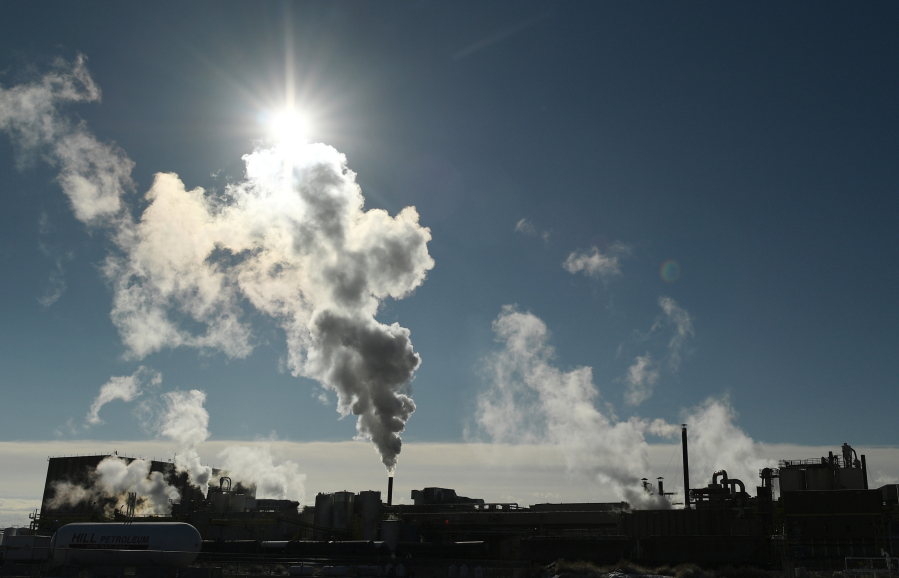Colorado’s air regulators have approved a new rule that will require the state’s 18 largest manufacturers to reduce their greenhouse gas emissions, but the plan is receiving pointed criticism from environmental advocates who say loopholes will allow the dirtiest companies to keep on polluting the most impacted communities.
The rule’s critics already were complaining about one potential loophole before the Colorado Air Quality Control Commission considered a draft proposal about two weeks ago. That provision was approved Sept. 22 when the commission created a system through which companies could earn credits for reducing emissions and then sell those credits to other manufacturers who can’t or won’t make changes.
Then, just before midnight Sept. 22, the commission added a new component that environmentalists say provides an even bigger loophole for the 18 companies. That measure would create a state-managed fund that large companies can pay into — without buying credits from another firm that has been reducing emissions — instead of investing in technology that can help them curb greenhouse gas emissions and other harmful pollutants.
The commission asked the Colorado Air Pollution Control Division to return in September 2025 with a plan to create that state-managed fund. Details on how the fund would work are not known, but the concept is opposed by environmentalists and people who live in communities most impacted by industrial air pollution.
“It just gets people out of making actual, real-world reductions,” said Ian Coghill, a senior attorney with Earthjustice’s Rocky Mountain office. “Most importantly, it’s letting people buy their way out of having to reduce all the co-pollution on their sites. They would just have to pay not to do it.”
State regulators who work to improve air quality and business leaders who represent the impacted companies defended the rule and the proposed fund, saying it will keep manufacturers from leaving the state while also forcing them to focus on reducing greenhouse gas emissions.
Plan mandated in 2021
The Air Quality Control Commission, an eight-member board appointed by the governor to regulate air pollution, approved the rule on Sept. 22. The greenhouse gas-reduction plan was mandated by a 2021 state law — House Bill 21-1266 — to improve air quality in disproportionately impacted communities where residents living near industrial sites are more likely to be low-income and Black, Latino or Indigenous.
The bill ordered the state’s industrial facilities to lower their greenhouse gas emissions by 20 percent, based on a 2015 baseline, by 2030. The bill also mandated that the industrial sector reduce other air pollutants at the same time.
The state’s Air Pollution Control Division, which writes policies that the Air Quality Control Commission approves, decided that goal could be achieved if it focused on the largest manufacturers in the state. Those manufacturers include Suncor Energy, Molson Coors, Western Sugar, Leprino Foods, Microchip Technology and Cargill Meat Solutions, and they represent about 15 percent of all climate pollution emitted by industrial and manufacturing facilities in Colorado.
The Air Pollution Control Division did not respond to The Denver Post’s request for an interview about the new rules.
Greenhouse gases include carbon dioxide, methane, nitrous oxide and fluorinated gases that trap heat in the atmosphere. They can linger in the atmosphere for years, accelerating global warming as they accumulate.
Under the new rule, the 18 manufacturers would need to take steps at their facilities to lower their emissions. That could occur by installing new, more energy-efficient equipment.
But those construction projects could be expensive, and some companies feared they would cut their reductions as much as possible and still not meet the goals.
So they needed other avenues toward compliance, said Doug Benevento, an attorney at Holland and Hart who worked on the rule on behalf of the Colorado Chamber of Commerce.
Companies would prefer to study state-of-the-art equipment that’s available to help them reduce emissions and then tailor a law that would require them to adopt that technology, Benevento said.
“This time, they developed a standard and then said, ‘Go figure out how you can meet the standard,’” he said. “It’s not clear how the standard can be met at any of these facilities. It may just not be possible.”
‘Imbalance of power’
The Chamber of Commerce also was concerned that the credit-trading system may not be viable because there would not be enough credits to go around, Benevento said. The state-managed fund is an alternative to the credit market.
The fund was supported by the Colorado Energy Office, a state agency whose mission is to reduce greenhouse gases and other air pollutants.
Will Toor, the energy office’s executive director, said the state wanted to have a backup plan so companies didn’t decide to move out of Colorado rather than reduce emissions. Some companies may install the latest technology and still not be able to achieve the 20 percent reduction.
“What we didn’t want to do is write a rule that might cause facilities to simply not actually reduce pollution but shift it to other locations,” Toor said. “With manufacturing, it’s operating in a national and global marketplace where it’s pretty easy to shift where production takes place. We wanted to make sure we have a rule where it’s really causing companies to invest in improving technology and reducing emissions, not just shift it into other places.”
But critics said the whole rule fails when it comes to protecting disproportionately impacted communities, which was the intent of the law that mandated the greenhouse gas reductions in the first place.
“There was just a huge imbalance of power in the room. We were very disappointed to see the commission adopt this rule that doesn’t satisfy the environmental justice act,” said Collin Tomb, Boulder County’s climate and health strategist and a member of a coalition of 44 local governments pushing for tougher rules. “The pattern of deference we’re seeing to industry is just really remarkable.”



